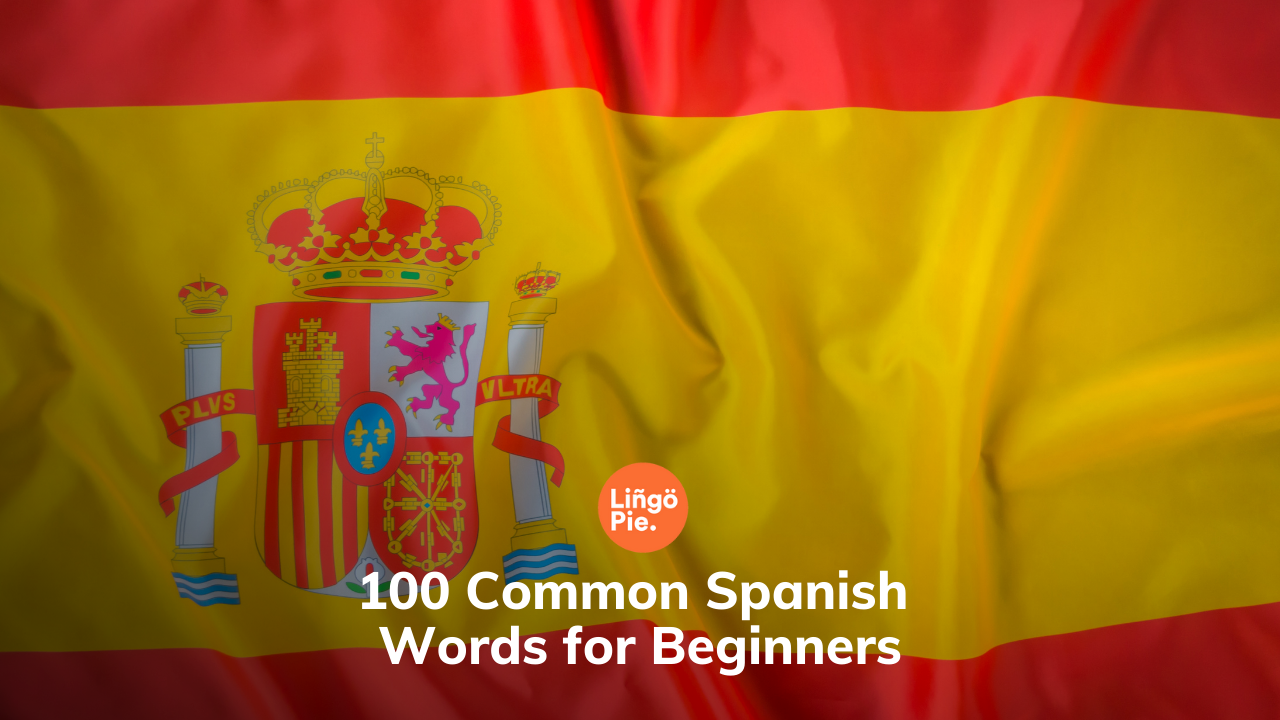Is there one best way to learn Spanish? And what are the 100 most useful words in Spanish to learn first? As you begin learning Spanish, you will have a lot of questions.
Read on to find the answers to your burning questions and learn 100 useful words and phrases in the Spanish language.
Learning common words in Spanish is essential for beginner Spanish learners who want to communicate with native Spanish speakers.
In this brief guide, we have compiled a list of 100 common words in Spanish for beginner language learners, divided into categories for easy reference.
Before we dive into our list, let's talk about the best way to learn Spanish at home.

The Best Way to Learn Spanish On Your Own
Learning Spanish is a great way to expand your language skills and connect with Spanish speakers around the world, especially if you plan to visit or live in a Spanish-speaking country, such as those in Latin America.
There are a lot of ways to learn Spanish fast for English speakers. One approach is to find a language partner, whether in person or online, who speaks Spanish fluently and is willing to practice speaking with you. Working on your speaking skills is a crucial step to take from day one.
Alternatively, you may want to consider online tutoring with private tutors who can provide personalized instruction at your own pace. This provides a safe space in which to practice Spanish speaking.
There are also many free apps and online software available that use a spaced repetition system to help you learn Spanish vocabulary and grammar quickly and easily. What's more, Spanish songs and Spanish podcasts offer high-quality exposure to the language in a fun and engaging way.
Likewise, watching a Spanish movie with Spanish and English subtitles can help improve your reading skills and give you a sense of real-life conversational Spanish at a native speed. Lingopie's streaming service offers dual subtitles so language learners can follow Spanish movies more easily. This helps with Spanish pronunciation and listening comprehension skills.
Regardless of your current level, whether you are a complete beginner or already have some experience with the language, incorporating these methods into your learning routine can be a great way to improve your Spanish pronunciation and comprehension skills.

Greetings and Introductions
Now, let's explore 100 common Spanish vocabulary words and phrases, alongside their English translations. These simple language building blocks are the first crucial steps toward learning a new language.
As a language learner, you will probably be most excited to start speaking a new language, and to do this effectively, you will need to know how to greet people.
- Hola - Hello
- Buenos días - Good morning
- Buenas tardes - Good afternoon
- Buenas noches - Good night
- Adiós - Goodbye
- Hasta luego - See you later
- ¿Cómo estás? - How are you?
- Estoy bien - I'm good
- Mucho gusto - Nice to meet you
- ¿Cómo te llamas? - What's your name?
Examples:
- Hola, mucho gusto. ¿Cómo estás? - Hello, nice to meet you. How are you?
- Buenas tardes. Estoy bien, gracias. ¿Y tú? - Good afternoon, I'm good, thanks. And you?
Numbers: Prices, Dates, Times, and Ages
Another crucial part of the Spanish language is numbers. You need numbers to understand prices, dates, times, and ages.
All of these aspects of a language are basic but essential for everyday life.
- Uno - One
- Dos - Two
- Tres - Three
- Cuatro - Four
- Cinco - Five
- Seis - Six
- Siete - Seven
- Ocho - Eight
- Nueve - Nine
- Diez - Ten
Examples:
- Mi cumpleaños es el tres de octubre - My birthday is on October third
- Tengo cinco años - I am five years old
- Son las seis y media - It's six thirty
- El libro cuesta nueve dólares - The book costs nine dollars

Times of the Day or Year
- Día - Day
- Noche - Night
- Mañana - Morning
- Tarde - Afternoon
- Fiesta - Holiday
Examples:
- Hoy es un buen día - Today is a good day
- Me gusta salir por la noche - I like to go out at night
- El banco está cerrado porque es una fiesta nacional - The bank is shut as it's a national holiday
Food and Drink
Another vital aspect of learning the Spanish language (and culture) is learning the common food and drink words. If you are lucky enough to study Spanish in Spain or Latin America, you will get well-acquainted with these delicious words very quickly.
- Agua - Water
- Café - Coffee
- Té - Tea
- Leche - Milk
- Pan - Bread
- Queso - Cheese
- Huevo - Egg
- Tortilla de patatas - Spanish tortilla
- Zumo de naranja - Orange juice
- Me pone/ me trae... por favor - Please give me/ bring me...
Examples:
- Me pone un cafe con leche, por favor - Please give me a milky coffee
- Me trae queso con el pan, por favor - Please bring me cheese with the bread

Transportation
Next, you will need to think about getting around a Spanish-speaking country, asking Spanish speakers for transportation advice and even developing your language skills to the point where you can help others on public transport.
- Coche - Car
- Autobús - Bus
- Tren - Train
- Avión - Airplane
- Taxi - Taxi
- Metro - Metro/ Subway/ Underground
Examples:
- ¿A qué hora llega el tren a Madrid? - What time does the train to Madrid arrive?
- ¿Dónde está la parada de autobús? - Where is the bus stop?
Clothing and Accessories
There are so many everyday items that you may wish to talk about in Spanish, it is hard to list them all. But some common words that you may use a lot in your native language are items of clothing and accessories, so here are a few basics.
- Camisa - Shirt
- Pantalones - Pants
- Zapatos - Shoes
- Gorro - Hat
- Bufanda - Scarf
- Gafas - Glasses
- Bolsa - Bag
Example:
- Llevo un gorro y una bufanda porque hace frío - I'm wearing a hat and a scarf because it's cold
- Mis gafas están en mi bolsa - My glasses are in my bag
Emotions and Feelings
At this point, you can start to express yourself more fully in your new language by using emotional words and phrases. As you practice Spanish, you will notice your own personality coming through more clearly in your speech.
- Feliz - Happy
- Triste - Sad
- Enojado/a - Angry
- Cansado/a- Tired
- Nervioso/a - Nervous
- Contento/a - Content
- Asustado/a - Scared
- Enamorado/a - In love
- Preocupado/a- Worried
- Emocionado/a - Excited
Note that the "o" endings are for males and the "a" endings are for females. Some Spanish speakers use an "e" ending if they prefer to present as nonbinary, though this is not widely used in all Spanish-speaking countries and is not one of the official Spanish grammar rules.
As you can see, the Spanish language, like all languages, continues to develop with society. Language is a beautiful tool for self-expression and learning, and this is one of the reasons why learning the Spanish language is such a wonderful idea.
Basic Places
- Casa - House
- Calle - Street
- Ciudad - City
- País - Country
- Mundo - World
Example:
- Barcelona es la ciudad más hermosa del mundo - Barcelona is the most beautiful city in the world
- ¿En qué calle está tu casa? - What street is your house on?
Useful Spanish Nouns
Now, we can start building our miscellaneous Spanish vocab, starting with some practical nouns. These are language building blocks that will help you to form whole sentences.
The more common words you know in Spanish, the more you will be able to express thoughts, as well as understand movies and TV shows.
Learning everyday nouns in Spanish can significantly improve your ability to comprehend and speak Spanish in a Spanish-speaking country. You might want to make Spanish flashcards of these common and useful words.
- Fuego - Fire
- Tierra - Earth
- Aire - Air
- Familia - Family
- Amigo/a - Friend
- Cuidado - Caution
- Ayuda - Help
- Dinero - Money
- Regalo - Gift
- Trabajo - Work
- Fiesta - Party
- Problema - Problem
- Pregunta - Question
- Respuesta - Answer
- Juego - Game
- Música - Music
- Película - Movie
- Libro - Book
- Vacaciones - Vacation
Regardless of your learning style, it's important to practice speaking Spanish regularly to improve your language learning process and gain confidence when communicating with native speakers.
This is where language exchange partners come in handy. They tend to be native speakers from Spanish-speaking countries. Your language partner will offer high-quality and authentic speaking practice in Spanish that cannot be replicated by audio courses or self-taught Spanish courses.
As you progress in your language studies, you can focus on mastering Spanish grammar and building your vocabulary. Memorizing common words and phrases in Spanish, such as those listed above, is a great start.
Common Spanish Verbs
Finally, here are some of the most commonly used and useful Spanish verbs. These can be combined with the nouns above to make whole phrases in Spanish.
And just like that, you can use and understand another language.
- Ser - To be
- Estar - To be
- Tener - To have
- Ir - To go
- Venir - To come
- Vivir - To live
- Poder - To be able to
- Hablar - To speak
- Comer - To eat
- Beber - To drink
- Hacer - To do/make
- Ver - To see
- Saber - To know (how to)
- Ayudar - Help
- Trabajar - Work
- Leer - Read
- Aprender - Learn
- Entender - Understand
Examples:
- Mi amigo quiere saber hablar Español - My friend wants to be able to speak Spanish
- Estoy aprendiendo Español para mi trabajo - I am learning Spanish for my job
- Tengo que aprender Español para entender esta película - I have to learn Spanish to understand this movie
You now have a list of 100 common words in Spanish for beginners, as well as some example sentences. Keep practicing and using these words in context to improve your Spanish skills.
If you do not have a Spanish speaker with whom to practice your language skills, you can use online resources instead.
There are various Spanish courses, Spanish podcasts, language-learning apps, and streaming sites that you can employ to help you learn Spanish faster. You can even find a Spanish tutor online, through sites like Lingopie, the language learning platform.
You will sound like a native speaker in no time with a bit of effort and determination.

FAQs About Learning the Spanish Language
Now, let's take a look at some frequently asked questions about learning Spanish at home.
How can I learn Spanish by myself?
You can learn Spanish by yourself with the help of mobile apps for language learning, audio courses, or podcasts designed for learning Spanish. If you prefer to study Spanish while having fun, you can watch Spanish TV shows and movies. The methods you use depend on your budget and learning style.
Can I learn to speak Spanish in 3 months?
Yes, you can learn to speak Spanish in three months at a reasonable level. If you are learning Spanish with a Spanish tutor, you may progress faster. This is because Spanish tutoring, on video chat or in person in a classroom setting, allows for natural conversation to occur. Sometimes, intensive classroom learning is the fastest way to learn.
Is Spanish difficult to learn?
No, learning Spanish is not too difficult. Most English speakers find that they can learn Spanish quite easily with the help of great resources, such as movies, apps, and a Spanish tutor. There are a lot of words in Spanish that are similar to English words. This makes learning the new language easier.
What is the best site for language learning?
The best sites for language learning are those that connect you with a language exchange partner who is a native speaker of your chosen language. You will also find sites that offer Spanish TV and movie content and tutoring to be very useful going forward.
Summing Up: 100 Common Spanish Words for Beginners
Hopefully, this list of 100 words in Spanish has kick-started your Spanish learning journey. You will have noticed that many words in the Spanish language are similar to English words, so if you speak English, you are already at an advantage.
As you can see, there are many ways to learn Spanish, from taking formal Spanish courses to watching TV shows and other Spanish-language media. This will also inform your awareness of Spanish culture.
Whether you prefer online Spanish classes or in-person language exchanges, there are many resources available to help you achieve your goal of speaking Spanish fluently.
Make a start today with Lingopie, and don't forget to take advantage of the interactive Spanish subtitles.





![Learn Spanish with La Casa de Papel [Money Heist] on Netflix](/blog/content/images/2023/05/Spanish-1--6-.png)




